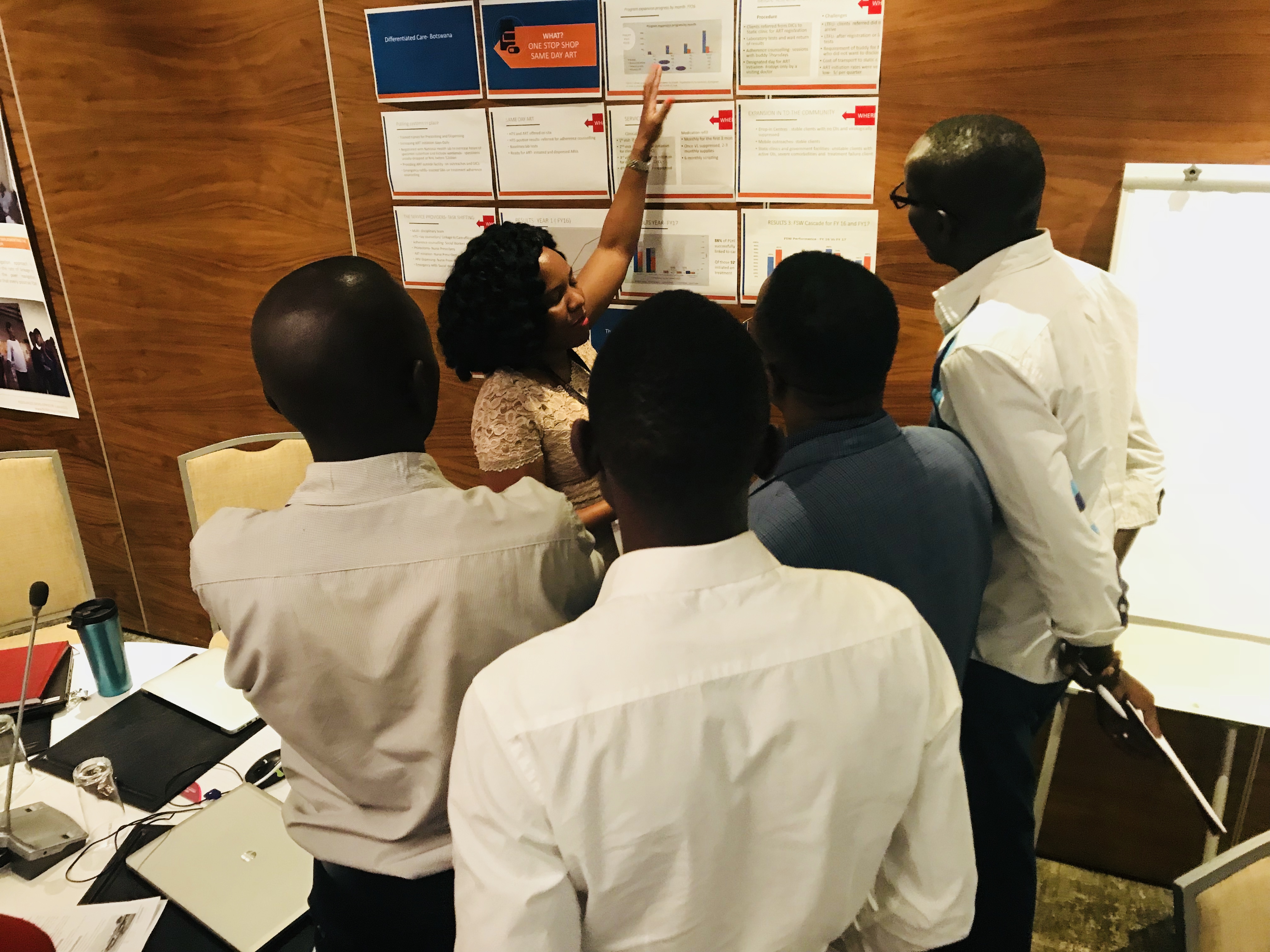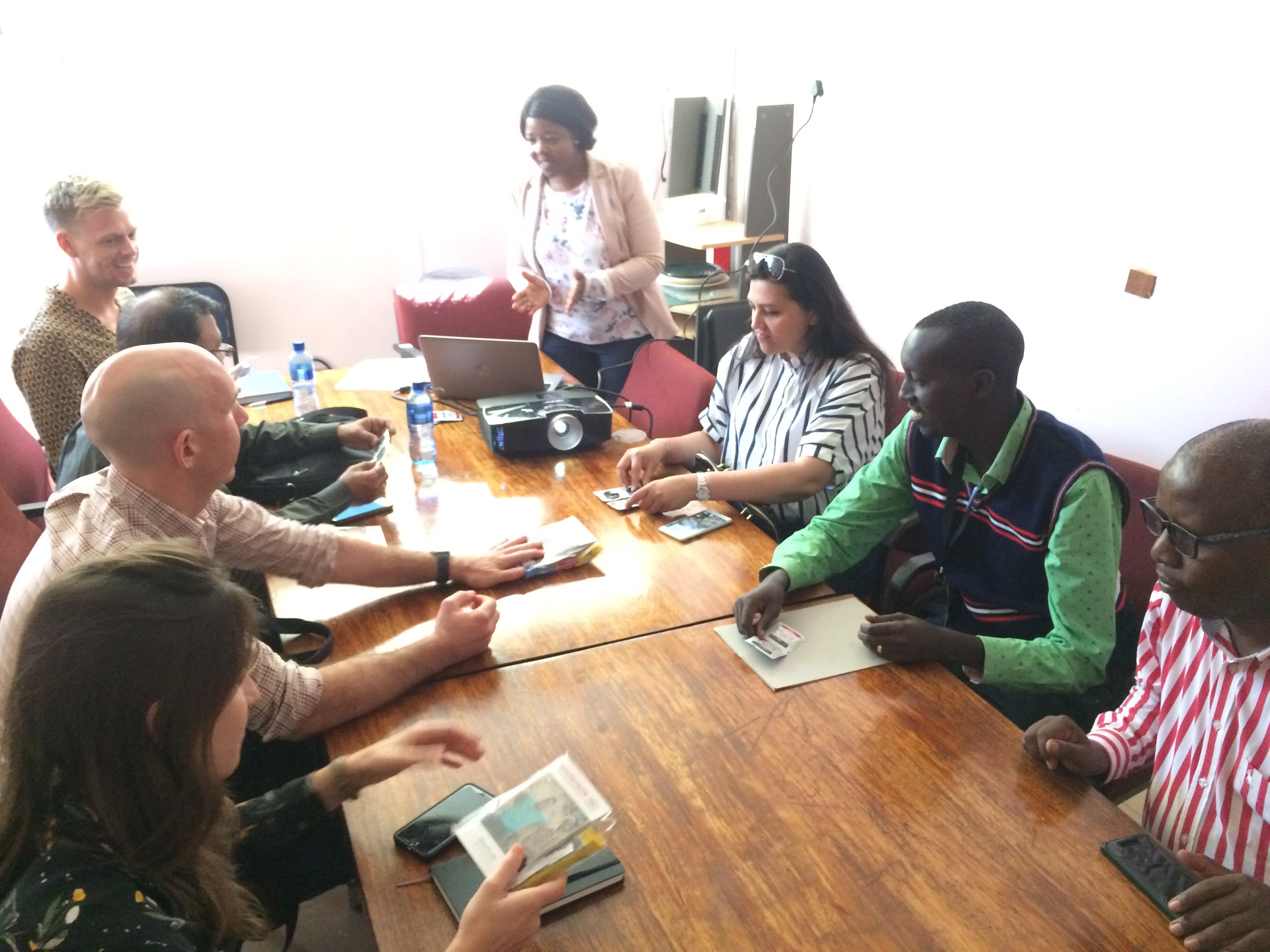Written by Lirica Nishimoto, Program Officer, LINKAGES
 Three years of the intensive Program Acceleration effort have helped many LINKAGES countries successfully lay the foundation for, as well as scale up, quality key population programming. Countries now need support to optimize critical interventions, new technologies, and proven strategies to continue advancing to the next level of programming. To kick off this second phase, termed Program Optimization, LINKAGES representatives from 15 countries gathered in Johannesburg, South Africa at the end of March 2018 for the 2018 Global Optimization Workshop to double-down on plans for achieving epidemic control and the UNAIDS’ 95-95-95 goals. The 49 participants of the workshop included representatives from LINKAGES country offices, technical and strategic information (SI) advisors, USAID, and PEPFAR. The objectives of this workshop were for country teams to (1) learn to optimize existing strategies to achieve 95-95-95 for key populations, (2) review strategic information progress at the global level and discuss new and emerging priorities, and (3) strengthen country plans to optimize the latest strategies and approaches to achieve 95-95-95.
Three years of the intensive Program Acceleration effort have helped many LINKAGES countries successfully lay the foundation for, as well as scale up, quality key population programming. Countries now need support to optimize critical interventions, new technologies, and proven strategies to continue advancing to the next level of programming. To kick off this second phase, termed Program Optimization, LINKAGES representatives from 15 countries gathered in Johannesburg, South Africa at the end of March 2018 for the 2018 Global Optimization Workshop to double-down on plans for achieving epidemic control and the UNAIDS’ 95-95-95 goals. The 49 participants of the workshop included representatives from LINKAGES country offices, technical and strategic information (SI) advisors, USAID, and PEPFAR. The objectives of this workshop were for country teams to (1) learn to optimize existing strategies to achieve 95-95-95 for key populations, (2) review strategic information progress at the global level and discuss new and emerging priorities, and (3) strengthen country plans to optimize the latest strategies and approaches to achieve 95-95-95.
The workshop focused on 11 topics, nine of which have been endorsed by PEPFAR as epidemic control solutions:
- Index testing/voluntary partner referral
- Enhanced peer outreach approach
- Information and communication technologies (ICT)/virtual mapping and outreach, including online and offline approaches
- Strategic information
- Differentiated service delivery models
- Viral load
- Peer navigation
- HIV self-testing
- Pre-exposure prophylaxis (PrEP)
- Partnerships with law enforcement
- Violence prevention and response
“This workshop was excellent. We are at a turning point in the implementation of LINKAGES in Haiti, and we need to ensure that we provide quality services to our beneficiaries through our implementing partners. The experience of sharing the particular details of a country’s activities brought new ideas to help us adapt new interventions.” —Steeve Laguerre, project manager, Haiti
During the Program Acceleration phase, many countries initiated integration of new technologies and strategies, resulting in an abundance of learning and best practices. To facilitate knowledge exchange between the countries, a significant portion of the workshop was led by country teams, who shared their own experiences, challenges, and achievements in implementing various interventions across the HIV service cascade.
Through small group discussions, presentations, and poster sessions, country teams had many opportunities to exchange ideas and learning on how to further advance and improve programming across the cascade. The question-and-answer sessions held at the end of each session also produced fruitful discussions. Midway through the week, participants had the opportunity to visit sites and clinics where key population programming is being implemented in South Africa. During the visits, they gained fresh perspectives on implementation strategies and how to overcome common obstacles.
“It was a wonderful cross-learning experience across the countries. The presentation of success stories from each country and the field visit were appreciated. Having the technical and SI teams together was a great opportunity to get clarification on the nitty-gritty of operationalizing the innovations and their reporting.” — M.R. Parthasarathy, technical director, India
In order to translate the workshop into concrete results at the country level, country teams created country optimization plans on the final day of the workshop to integrate what they had learned during the week and focus on next steps. Workshop participants left the workshop feeling more committed to improving their programs and advancing the LINKAGES agenda.
“[The workshop] was very beneficial, as it provided me with a space to reflect in detail on each part of the cascade and on the program as a whole. I feel we now have new inputs directly related to our daily work that will improve our service delivery throughout the cascade. Overall, it was definitely worth participating in!” – Rafaela Egg, prevention advisor, Angola
